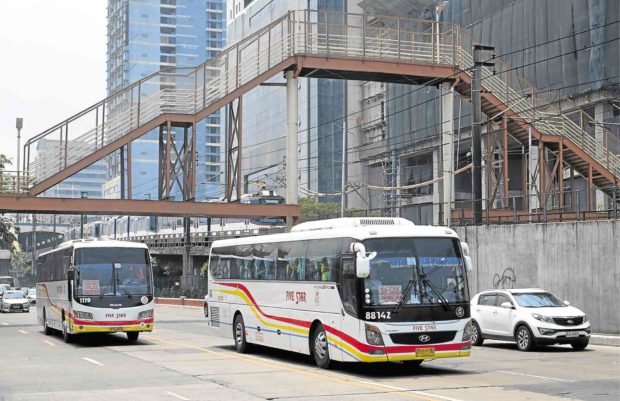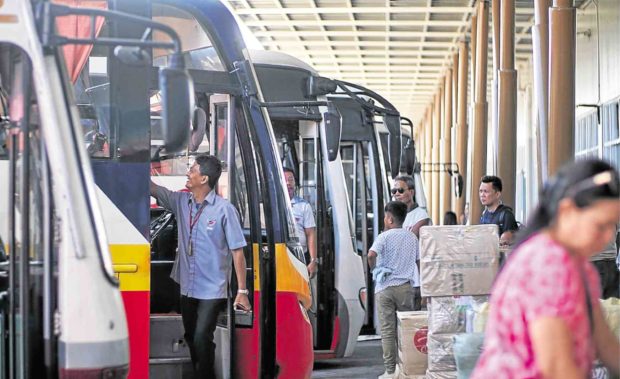Albay solons oppose MMDA bus ban

EASING EDSA CONGESTION Buses from provinces in northern and southern Luzon will soon be banned from plying Edsa as their terminals along Metro Manila’s busiest road will be closed to ease traffic congestion. —NIÑO JESUS ORBETA
LEGAZPI CITY — Lawmakers in Albay province have opposed the plan of the Metropolitan Manila Development Authority (MMDA) to stop provincial buses from plying Edsa and the transfer of their stations to a terminal at Santa Rosa City in Laguna province.
Albay Rep. Fernando Gonzalez (third district) and Ako Bicol Rep. Alfredo Garbin on Saturday joined Rep. Joey Salceda (second district) in opposing the plan.
The MMDA said the ban could help ease traffic congestion in Metro Manila. The agency was planning to close 46 terminals for provincial buses and other public utility vehicles (PUVs) on Edsa by June.
Bus operators will be relocated to terminals in the cities of Parañaque, Santa Rosa and Valenzuela where passengers may transfer to Metro-bound PUVs.
Salceda, in an interview, said the ban would cause “great economic disruption, inconvenience, expenses and damages to multitudes of commuters to and from as far as the Visayas and the Bicol region.”
Article continues after this advertisementHe called the ban “antipoor and antiprobinsyano.”
Article continues after this advertisementSolution
Salceda, Gonzalez and Garbin, in separate interviews, agreed that one of the solutions to the worsening Metro Manila traffic situation was for the government to roll out an “efficient, effective and affordable” mass transportation system.
They recommended that PUVs, such as buses and commuter trains, be managed and operated by the government, citing the transportation systems of New York, Canada and Japan as examples.
“If the MMDA thinks that this (bus ban) can solve the Metro Manila traffic problem, then they are wrong because the only solution to this is for the government to provide an efficient, effective and affordable transport system,” Garbin said.
“The reason we have millions of private vehicles plying Edsa is because we don’t have a public transport being managed and operated by the government,” he said.
Salceda, citing transportation statistics, said there were 2.8 million cars in Metro Manila while provincial buses numbered only 4,000.
“Who do you think is actually causing traffic?” he asked in Filipino.
‘Sacrificial lambs’
Salceda said at least 1,500 buses from southern Luzon were plying the Metro Manila route, while another 2,500 were servicing northbound passengers. He said 236 buses were plying the Albay-Metro Manila route.
Gonzalez said he had already discussed this matter with Catanduanes Rep. Cesar Sarmiento, chair of the House committee on transportation. He said the committee had passed a resolution asking the MMDA to defer the implementation of its order.
“Let us look for other ways to address the problem without making provincial buses and its passengers sacrificial lambs,” Gonzalez said.
“The ban is unacceptable and it will be chaotic for Bicolano bus riders and also [those from the] Visayas and Mindanao,” he added.
According to Salceda, the ban shifts the burden of inconvenience to provincial commuters, particularly students, small traders and families with relatives in Metro Manila, as they will now have to pay extra fare.

MANILA-BOUND The Legazpi City Grand Terminal in Albay province is busy on Sundays as passengers return to Metro Manila. MARK ALVIC ESPLANA
Salceda said the ban was antipoor since most provincial bus passengers were those who could only pay fares lower than P1,000.
Inconvenience
“This measure is injurious to poor rural people in terms of additional inconvenience, additional minimum fare, additional time to destination and double loading,” he said.
“Albayano traders and commuters, especially those who cannot afford more expensive air transportation, are being deprived of their mobility,” he added.
“While each bus can carry 50, each car carries only five. So, theoretically, if you have 3,000 buses from the provinces, you are exchanging them for 15,000 more cars on Edsa,” he said.
Technically, instead of one provincial bus bringing in 50 passengers, they will now need four jeepneys to ferry 12 people each, Salceda said.